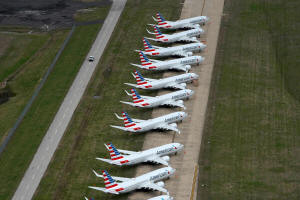U.S. approval for 737 MAX return nears as challenges remain for Boeing
 Send a link to a friend
Send a link to a friend
 [November 16, 2020]
By David Shepardson [November 16, 2020]
By David Shepardson
WASHINGTON (Reuters) - After a standoff
with global regulators, management turmoil and a massive safety review,
Boeing Co <BA.N> is set to win U.S. approval on Wednesday to resume
flights of its grounded 737 MAX.
But the largest U.S. airplane maker faces headwinds from the coronavirus
and new European tariffs as it scrambles to return the best-selling jet
to service.
Reuters first reported on Nov. 9 that the FAA was in the final stages of
reviewing proposed MAX changes and was set to lift its grounding order
as early as Wednesday.
The FAA decision comes as other global regulators also move closer to
decisions on allowing the plane to resume flights.
A group of relatives of MAX crash victims and some U.S. House Democrats
have urged the FAA to disclose key supporting data in its examination of
the plane.

The FAA is requiring new training to deal with a key safety system
called MCAS tied to the two fatal crashes that killed 346 people and led
to the plane's grounding in March 2019. It is also requiring new
safeguards to MCAS and other software changes.
Last month, FAA Deputy Administrator Dan Elwell, who made the U.S.
decision to ground the plane, told Reuters he had "absolutely no doubt
in my mind that it will be as safe as, or safer than, any airplane in
service today."
In December, Boeing's board forced out prior chief executive Dennis
Muilenburg after he received a rebuke from FAA Administrator Steve
Dickson. At the time, the FAA said Boeing was pursuing an unrealistic
schedule for the return to service.
On Oct. 28, Boeing Chief Executive Dave Calhoun told CNBC the MAX review
was nearing the finish line. "I am very proud of that airplane," Calhoun
said. "It is a remarkable machine and as safe as anything in the air."
[to top of second column]
|

A line of American Airlines Boeing 737 MAX passenger planes are
parked on the tarmac at Tulsa International Airport in Tulsa,
Oklahoma, U.S., March 23, 2020. REUTERS/Nick Oxford/File Photo

Last week, in a long-running transatlantic subsidy spat, the
European Union imposed tariffs on up to $4 billion of annual U.S.
imports, including Boeing jets.
Leasing companies warned the tariffs would hamper the reintegration
of the MAX in Europe, a key market. Irelandís Ryanair said it would
expect Boeing to absorb the cost of the tariffs, which mirror U.S.
duties on imports of Airbus jets and other European goods.
Following the FAA green light, airlines must complete software
updates and fresh pilot training, a process that will take at least
30 days, before planes can return to the skies.
The FAA said it would not delegate its authority to issue
airworthiness certificates and export certificates for the 450 737
MAX airplanes built since the grounding, and plans in-person,
individual inspections.
Those could take a year or more to complete.
Southwest Airlines <LUV.N>, the world's largest MAX operator, has
said it would take several months to comply with the FAA
requirements and it does not plan to schedule flights on the
aircraft until the second quarter of 2021.

(Reporting by David Shepardson in Washington; Additional reporting
by Tim Hepher in Paris; Editing by Clarence Fernandez)
[© 2020 Thomson Reuters. All rights
reserved.] Copyright 2020 Reuters. All rights reserved. This material may not be published,
broadcast, rewritten or redistributed.
Thompson Reuters is solely responsible for this content. |